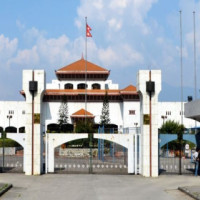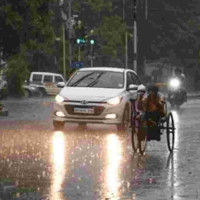- Friday, 2 May 2025
Is Our Republican System Functional?
Nepal is marking Republic Day today amidst heightened political tension and polarisation. The political parties, represented in the House of Representatives (HoR), are divided into ruling and opposition camps. The main opposition Nepali Congress (NC) has been disrupting the House proceedings, demanding the formation of a parliamentary committee to investigate the alleged fraud and abuse of cooperative money by the sitting Home Minister. The day Prime Minister Pushpa Kamal Dahal Prachanda secured the vote of confidence, the scene in the HoR meeting was chaotic. The opposition was sloganeering against the government as the PM was speaking from the rostrum. Obstructions, clashes, and shouting sway the House meeting these days, much to the chagrin of the commoners. This scenario does not bode well for the young republic.
Two election cycles were completed after the country was declared a republic in 2008. The nation’s ushering in the republican system marks a landmark event in the annals of its history. However, this defining moment was the culmination of all people’s past struggles for freedom, dignity, and happiness. One of the oldest nations in the world, Nepal’s precious time for nation-building was consumed by futile fighting for power, conflict, massacres, and relentless movements ever since it was unified in 1768. For a long time, the country came under the rule of the Rana Oligarchy, which deprived the people of basic rights to live a decent life. In 1951, the country saw the first ever democratic upheaval that ended the autocratic Rana regime and opened the door to democracy and modernity for Nepalis.
Historic proclamation
On February 18, 1951, through his historic proclamation, king Tribhuvan announced that an elected constituent assembly would draft a new constitution within two years. However, writing a constitution through the elected representatives was deferred for more than 65 years. In 2015, the country got a new constitution authored by the Constituent Assembly (CA). Prior to this, the Himalayan nation went through a series of political tumults. Nepalis had to wage various rounds of civic movements against the party-less Panchayat for 30 years. In 1990, multiparty democracy was reinstated, but it could not deliver as per the constitution and parties’ electoral promises. Political instability again plagued the nation.
The deepening crisis in the parliamentary system, raging Maoist insurgency, and royal massacre set the stage for the rise of King Gyanendra. The monarchy’s continuous distaste for democracy eventually spurred a decisive protest in the streets of Kathmandu in 2006. It restored the dissolved HoR that suspended the king until the first meeting of the Constituent Assembly formally abolished the 240-year-old kingship. The new constitution institutionalised a federal, secular, and republican system. This transformation was epochal in addressing structural social, economic, and regional disparities.
The national charter embodies the spirit of the republic, as it has vested sovereignty and state power in the Nepali people. Its preamble reads: “We, the people of Nepal, in exercise of the sovereign powers inherent in us, embrace the sovereign right of the people and the right to autonomy and self-rule.” It has incorporated 31 fundamental rights and four duties for citizens. Derived from the Latin word 'res publica’ that stands for ‘public affair,’ a republic is a true democratic form of government in which sovereign power is rested in people and their representatives.
The literal sense of republic has undergone alteration since it came into use in ancient times. This is owing to the various kinds of revolutions that took place from the 18th to the 20th centuries. However, its essence has remained the same—popular sovereignty—no matter which forms of governance system are in place. Plato, who wrote ‘The Republic’, envisioned a republic ruled by a philosopher king and based on the concepts of justice, order, and morality. In the 16th century, French philosopher Jean Bodin defined it as “the rightly ordered government of a number of families, and of those things which are their common concern, by a sovereign power.” For Bodin, ‘common good’ is central to the idea of a republic.
The common good is beneficial to all members of society, in contrast to the private good of a handful of people. It can be achieved through active citizenship and collective action. The common good can also be used interchangeably with ‘public goods’. Health, education, employment, social security, and a clean environment are common goods that every citizen is entitled to. Under the republican order, the government, political parties, bureaucracy, civil society, and other stakeholders must work to cater to the public good.
Intergenerational justice
Now the onus is on the political parties to translate the constitutional vision into reality. It is necessary to enhance the people’s faith in the federal republic, which is not living up to public expectations. Today's challenges lie in overcoming people’s despair arising from poor service delivery, rampant corruption, unemployment, insecurity, and poverty. The Republican system is a broad-based system that demands the democratisation of parties and society as a whole. Nepali political parties must not drag their feet in ensuring intergenerational justice in their organisational wings. Gerontocratic leadership can’t be believed to steer the nation on the path of stability and inclusive growth.
It goes against the grain of republican spirit if the major decisions pertaining to the affairs of the state are made by a limited number of leaders in collusion with self-centred elites. The elected officials should perform in a transparent manner and be accountable for their decisions. Public institutions should be strengthened and kept away from undue political interference. Public policies need to be rewritten as per the constitution, which envisages a socialism-oriented economy and welfare state. In order to make the republican system robust and functional, the parties have to imbibe republican values, norms, and principles and act accordingly.
(The author is Deputy Executive Editor of this daily.)
















